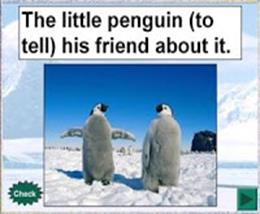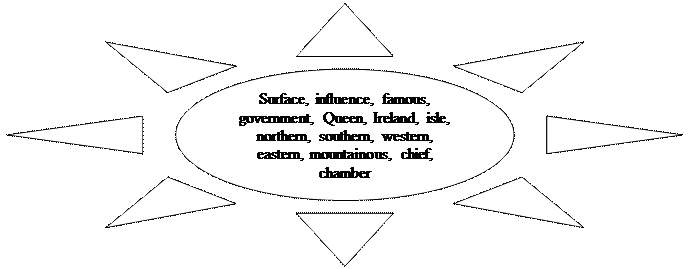 |
|
Consolidation of grammar material
Speaking
Put the verbs into the simple past:


Write the past forms of the irregular verbs.
| Infinitive | Simple Past | |
| 1. | meet | . |
| 2. | drive | . |
| 3. | speak | . |
| 4. | put | . |
| 5. | write | . |
| 6. | sing | . |
| 7. | do | . |
| 8. | sit | . |
| 9. | stand | . |
| 10. | run | . |
Complete the table in simple past.
| Affirmative | Negative | Interrogative |
| He wrote a book. | ||
| He did not sing | ||
| Was she pretty? |
Writing
Put the verbs into the simple past:
- Last year I (go) to England on holiday.
- It (be) fantastic.
- I (visit) lots of interesting places. I (be) with two friends of mine .
- In the mornings we (walk) in the streets of London.
- In the evenings we (go) to pubs.
- The weather (be) strangely fine.
- It (not / rain) a lot.
- But we (see) some beautiful rainbows.
- Where (spend / you) your last holiday?
Put the sentences into simple past.
- We move to a new house. →
- They bring a sandwich. →
- He doesn't do the homework. →
- They sell cars. →
- Does he visit his friends? →
Write sentences in simple past.
- Janet / miss / the bus →
- Nancy / watch / not / television→
- she / read / a book →
2. Consolidation of new lexics:
Speaking
1.Read the following words correctly, pay attention to the pronunciation.

2. Translate the following words and define their suffixes.
a. mountainous, Northern, Western, industrial, cultural, educational, intellectual, political
b. (is) situated, (is) called, (are) considered, (is) ruled, elected
c. Producer, exporter
3. In the table you must find 10 geographic names from the text.
| F | E | N | T | V | D | S | J | F | J | G | X | T | E |
| G | D | E | H | E | G | L | A | S | G | O | W | E | N |
| H | I | R | A | W | E | R | T | Y | U | I | O | S | G |
| F | N | T | M | I | U | Y | T | R | E | W | Q | F | L |
| S | B | Y | E | U | I | R | E | L | A | N | D | C | A |
| G | U | U | S | A | S | D | F | G | H | J | K | M | N |
| J | R | I | C | A | R | D | I | F | F | S | Z | B | D |
| D | G | O | J | H | G | F | D | S | A | C | X | L | D |
| G | Y | O | U | I | O | K | L | H | G | O | C | O | T |
| H | B | E | L | F | A | S | T | G | M | T | V | N | D |
| D | Z | G | U | O | L | J | H | G | F | L | H | D | Y |
| H | N | V | X | Z | S | D | E | R | T | A | B | O | I |
| D | W | A | L | E | S | J | B | N | G | N | F | N | L |
| H | K | G | W | P | G | G | N | C | A | D | G | E | Z |
Writing
3. Match the words with their translations
 |
- Choose the proper word for the definition:
1. Outside or outward appearance of something.
a. vast plain b. influence c. chief d. surface e. chamber
2. Hall used for meeting of an assembly
a. vast plain b. influence c. chief d. surface e. chamber
Speaking
Read a dialogue and make your own.
- - Where are you from?
- - I am from Great Britain.
- - Really? What city do you live in?
- - I live in London.
- - People say that London is one of the most beautiful cities in the world. Is it really so?
- - Yes, it is. My city has many sightseeing: The House of Parliament, Big Ben, Buckingham Palace, The Tower, The Tower Bridge and so on.
- - As far as I understood the city is very old and all of the buildings are historic.
- - No, you are mistaking. London is full of modern buildings which also become its sights. Nowadays London is a combination of old and modern buildings.
- - I wish to see you city!
- - Welcome!
Theme:Lexics: English speaking country.
Grammar: 1. Demonstrative pronouns: this, these, that, those
2. Future Simple Tense
Aim:didactive aims: to form communicative competence in students:
- to enlarge knowledge on developing students’ skills in practice of speech
- to teach students to comment the text and to give their own opinions
- to teach students on discussing the content of the theme and dialogical speech
Form of conducting: making-up a dialogue, working in pairs.
Hand-outs:grammar table, cards with exercises.
Literature:
Basic:
11. “Essential English for medical students”, A.M.Maslova, Z.I.Winestein, L.S. Plebeyskaya,
M.-2003, p.216-218
12. “ Grammar in Use” for elementary and intermediate students, R.Murphy, p. 132-135
Additional:
1. “Headway”, Elementary, Oxford University Press, 1995.
2. “Vocabulary in use”, Intermediate, Stuart Redman with Ellen Shaw, Cambridge University Press, 2001.
Tasks:
a) to enlarge students’ knowledge in the given theme for developing practical skills in commenting and giving their opinion
b) to develop students’ skills on monological and dialogical speech on the given theme by using new lexics and grammar